Author: Yana Kazmirenko, Ukraine
At AIDS 2018 to be held in Amsterdam, Ukraine will be the focus of attention. It is one of the leading countries in terms of HIV transmission, with half of people living with HIV not knowing their status and the war in the east of the country combined with hundreds of thousands of migrants contributing to the aggravation of the situation with HIV. Our article highlights what expectations representatives of Ukraine have from AIDS 2018 and what experiences they are ready to share.
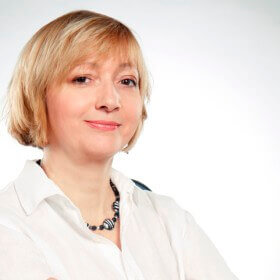 Olena Voskresenska, Director of AFEW-Ukraine
Olena Voskresenska, Director of AFEW-Ukraine
Expectations from AIDS 2018
I hope that the conference will help to draw attention to the region of Eastern Europe and Central Asia, in particular to Ukraine. Our country is interested in the experience of countries, which have a social contracting mechanism for non-governmental organisations because NGOs currently play a key role in the delivery of services to the populations most vulnerable to HIV and the support that comes from the governmental budget to these services will be most relevant for Ukraine after withdrawal of the Global Fund.
Opportunities of the conference
AFEW-Ukraine plans to learn about the promising models of work with our target populations, primarily aimed at young people. We are going to share our experience of working with adolescents who use drugs.
This year we have been able to support our partners from the regions of Ukraine, including programme clients and community members, who will take part in the conference. Using the experience of other countries, through joint efforts we will improve our activities in Ukraine.
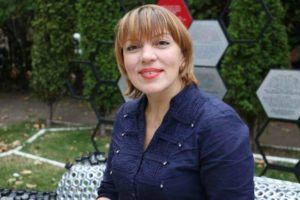 Vira Varyga, Chair of the Board of Positive Women NGO, leader of the self-help group for HIV-positive women, Kyianka+
Vira Varyga, Chair of the Board of Positive Women NGO, leader of the self-help group for HIV-positive women, Kyianka+
Expectations from AIDS 2018
This will be my first time to participate in a conference of such level. We will share the experience of the self-help group for HIV-positive women, Kyianka+, where we provide services to women living with HIV, helping them to accept their status and overcome stigma.
The model that we apply is patented in the Netherlands. It is based on personal development and leadership. The woman not only accepts her own status, she also helps others and is involved in the life of the group, in the advocacy and representation of the community interests.
Opportunities of the conference
We would like to learn about the new methods of work with women, about prevention, treatment and diagnostics. We hope that the participants will appreciate our social theatre, where the mime performance and direction are the products of creative activities of the Kyianka+ members.
At the conference, we will also offer some hand-made items produced by our activists for sale. The money we earn will be used to support the women who are hospitalized and do not have resources to pay for their treatment.
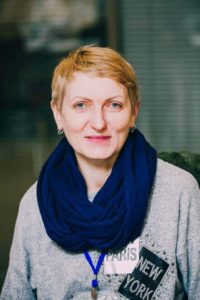 Nataliia Isaieva, Director of All-Ukrainian Charitable Organization, Legalife-Ukraine
Nataliia Isaieva, Director of All-Ukrainian Charitable Organization, Legalife-Ukraine
Expectations from AIDS 2018
Taking part in the Amsterdam conference, I plan to achieve two goals: first, study the experience of countries from which the Global Fund has withdrawn. In Ukraine, there is an alarming trend: the Global Fund withdrawal leads to the collapse of the health care system to vulnerable populations’ support. For instance, we lack friendly gynaecologists. Sex workers cannot go to public clinics as they hide vital information about their occupation and therefore they will not receive adequate treatment.
The second question, which is very important for us, are the increased restrictions of working conditions. Commercial sex services and human trafficking are more and more undesirable linked with each other and this often is leading to serious consequences for the sex-workers. USA adopted SESTA-FOSTA legislation, which intends to curb sex trafficking but has as a consequence that it prohibits offering sex services via internet. Such laws make it impossible for sex workers to look for their clients online so they are forced to go back on the streets, risking their lives and health. The “crackdown” trend is typical not only for the United States, so we need to offer a joint strategy to confront such “crackdown” policies.
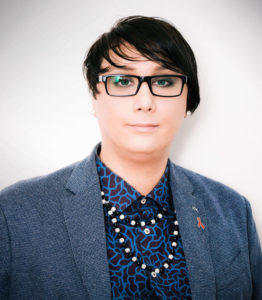 Igor Medvid, HPLGBT coordinator, involved in social activism since 2004
Igor Medvid, HPLGBT coordinator, involved in social activism since 2004
Expectations from AIDS 2018
At the conference in Amsterdam, I will present a thesis based on the findings of “The study of behaviours of transgender persons and their needs for HIV prevention services in Ukraine.” We interviewed 438 people and currently, it is the biggest study in Eastern Europe and Central Asia. The study showed that the HIV prevalence among transgender persons is up to 21%. 91% of transgender persons provided sex services at least once. At the same time, the level of condom use is extremely low – 69% of respondents did not use condoms during the last intercourse. This study allowed us getting statistical data and receiving a Global Fund grant. Without the support of AFEW we would not be able to conduct the study.
Now we are opening a regional office, launching a site, making efforts to increase the visibility of transgender people. Before the end of this year, we would like to introduce a member of our population to the Country Coordinating Mechanism.
Another objective that I have for the conference is to learn as much as I can about the cross-cutting activities because transgender people fall into three groups: MSM, sex workers, and people who inject drugs.
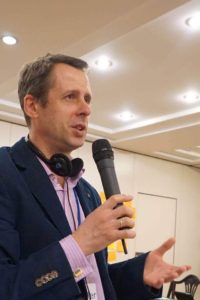 Aleksandr Mogylka, Director of the Compas day care centre for adolescents who practise risky behaviours (division of the Blago Kharkiv Charitable Foundation)
Aleksandr Mogylka, Director of the Compas day care centre for adolescents who practise risky behaviours (division of the Blago Kharkiv Charitable Foundation)
AIDS 2018 is…
…a global-scale event, which can be compared to the major film festivals, air and motor shows. The only difference is that at the conference apart from successes and achievements we will also be talking about the ways to overcome challenges. It is good to watch films, drive cars and feel proud of the achievements in aircraft or spacecraft engineering when you are healthy.
The problem of HIV/AIDS may not be resolved only by fighting the virus. It may be resolved by changing the attitude to this issue and by changing people’s attitudes to themselves. Many countries have already taken such steps and reduced the risk of development of the epidemic.
Opportunities of the conference
We would like to learn about the best practices in fighting HIV and to share the experience of our organization in involving law enforcement agencies in HIV prevention among most-at-risk adolescents.
A police reform has been implemented in Ukraine and adolescents now see the police as something new and interesting. Our objective was to unite the resources of NGOs and police to prevent the use of drugs, which often lead to experiments in sexual relations. Building trust relations between adolescents and police contributed to the formation of a city mechanism to refer adolescents to the network of partner organizations formed at the initiative of the Foundation.
Unconventional formats of cooperation between the police and civil society organizations can help to change the behaviours of adolescents.
 Natalia Bezeleva, Executive Director, Svitanok Donetsk Charitable Organization
Natalia Bezeleva, Executive Director, Svitanok Donetsk Charitable Organization
AIDS 2018 is…
…an opportunity to show yourself to the world and access the best international practices. In 2010, Svitanok received the Red Ribbon Award, which is the Oscar of health care. We received it for our work with children. The award was given to us at the opening of the conference when Bill Clinton delivered his speech and the singer Annie Lennox presented her foundation. It was a great success both for our organization and for Ukraine.
Expectations from the conference
At the conference, people will be asking me questions about the situation in the east of Ukraine. We have a lot to be proud of: in two years, we restored the ruined laboratories, AIDS centre and services. For the first time ever, a regional HIV/AIDS and tuberculosis programme was adopted and funded. Now we also have a roadmap for the transition period, when donors will withdraw from the country and all services will be funded by the government.
As a social worker and an internally displaced person, I am interested in the topic of gender in terms of what impact the situation of women has on the epidemic of HIV/AIDS.



